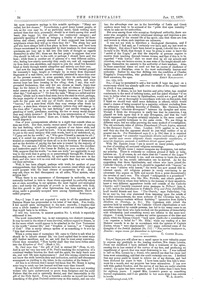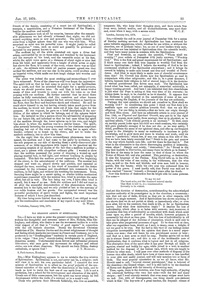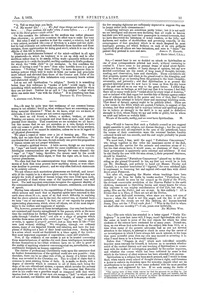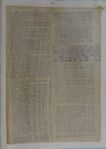 |
vol. title: Vol Four of The Theosophical Society of The Arya Samaj of Arya-wart vol. period: Sept 1878 – Sept 1879 pages in vol.: 350 |
<Untitled> (Sir,—I hope...)
Sir,—I hope I am not expected to reply to all the questions Mr. Stainton Moses has propounded in his letter of last week. For, firstly, I feel myself quite incompetent to the task; secondly, I suppose that even a whole number of The Spiritualist would not contain the pages that would have to be written.
I will try, however, to answer question No. 5, which is especially addressed to me.
The word immortality has, in my conception, two distinct meanings. It may be used in the sense of mere survival, without regard to fitness, or in the sense which would appear to be attached in the New Testament to the words “eternal life,’’ and “kingdom of heaven,” or “kingdom of God.” This is surely always spoken of as something to be won by “him that overcometh.”
When a young man of exemplary life came to Christ to ask what he should do to inherit eternal life, our Lord replied that he must make still further sacrifices, and we are told that he went away sorrowing. Christ then remarked, “How hardly shall they that have riches enter into the Kingdom of God.” (Mark x. 23).
St. Paul says that “the gift of God is eternal life” (Rom. vi. 23). And is not the very key-note of St. Paul’s teaching the recognition of a continual warfare between the flesh and the spirit, the daily death unto sin, and new life unto righteousness? And who among ourselves does not know the strife between duty and inclination, and the self-abasement consequent on yielding to the latter, to the exclusion of the former?
All this is so obvious that I cannot but think that Mr. Moses is laying some trap to catch one less learned and less wary than himself.
Every M.A. of Oxford will of course know that there are not wanting writers who have endeavoured to prove from Scripture and the early Fathers that the soul is naturally mortal, and that immortality is the gift of the Holy Spirit. Even so humble a scholar as myself has heard something of the great Dodwell controversy on this matter, and one who has the advantage over me in the knowledge of Latin and Greek authors must bear to be accused of the “pride that apes humility” when he asks me for authorities.
But even among those who accept no Scriptural authority, there are some who recognise in certain intuitional stirrings and impulses a presumptive proof of the eternal life of the spirit; also that there are men and women to whom such impulses are unknown.
It was not my wish to introduce a theological discussion, and I thought that I had said, as I certainly now have said, my last word on the subject. But since I have been forced to speak, I should like to say, in reply to Dr. Wyld, that though it may be given to some to know the “secret of the Logos,” yet that the majority of persons require to receive their teaching through human means, and that if this is to be regarded “with horror,” then we must shut up all our schools and churches, even our lecture-rooms, in case some of the taught should subjugate themselves too entirely to the authority of their teachers. Alas, in these anarchical times we need not fear an excess of obedience or submission to discipline, even to the most undoubtedly heaven-sent authority. Rather we may fear drifting into the condition of Charles Kingsley’s Doasyoulikes, who gradually returned to the condition of their ancestors, the apes.
Jan. 13th, 1879.
<Untitled> (Sir,—I may be...)
Sir,—I may be permitted to add a few words (I hope the last) on a controversy which has already spilt over the sides of the original vessel in which it was contained.
The Rev. S. Moses, in his last forcible and pithy letter, has recalled combatants to the need of defining terms, and has asked whether “if we were to define what we mean by Spiritualism, would not a good deal of fog lift?” I am so thoroughly in accordance with him on this point, that I think we should wait until some definition is offered, which would stand a chance of being accepted by a majority, without excluding from its principles any definite minority of thinkers. Mr. Stainton Moses recognises the “absolute divergence” between his thoughts and mine. Though I think the divergence is really less that he conceives, I am pleased we both agree that it is only divergence, and that the radii which represent our thoughts certainly originate in the same centre of truth, and possibly terminate in the same circle. We see things in different ways, but are alike pursuing the same method of investigation. The old scholastic rules of Adrian Heereboord (Proxis Logica, annexed to the Synopseos Logicæ, 12mo. London: 1676) applies to us both; and they say that the opponent should do just what neither of us at present can do. For Heereboord says (I. c. p. 296) that it is required of the opponent “ut sentential respondentis directæ contradicat; quod ut fiat oportet ante omnia diligenter thesin respondentis considerare, et accurate despicere, quomodo ci antithesis directc opponi possit.”
With Mr. Enmore Jones I am in accord on many points, especially on that of avoiding all sectional religious surmisings.
From Dr. Wyld’s views I cannot recognise my divergence, but rather my polarity. There is evidently no common ground of faith or belief between us. I, of course, do not claim that the “secret of the Logos” has been especially revealed to me, and am curious to learn the source whence such (to me, occult) information can be derived. As for the supposition that those Spiritualists, and others who have joined the Catholic Church, or who are in it, should be regarded with “horror,” as if we were “elusive wild beasts,” the world has now passed this intolerant epoch. All religious polemic is rarely convincing to an adversary who argues on faith and morals from a point diametrically the reverse of one’s own. The alleged “subjugation to a priesthood” by those Spiritualists, who like Mrs. Nichols, and others prefer to worship the God in whom they believe in the manner of their ancestors, bears a very different appearance inside and outside of the Catholic Church; and I heartily commend some passages in Billuart (tom. ii. p. 110), and in the introduction to Fefsler’s True and False Infallibility, to all candid friends and foes. “The Church,” says Pallevicini, “as far as may be, has ever abstained from imposing upon the minds of men that commandment, the most arduous of the Christian law, viz., to believe obscure matters without doubting” (quotation from Ryder’s Idealism, on Theology, p. 25.) The vagueness with which the opinions held by members of the Catholic Church (Spiritualists or not) are often conceived by outside persons, has led in too many cases to an assumption that those who have worked out the problems of immortality with scholarship (and something more) are inferior to the mere text chipper. I must, however, confess my entire ignorance of the time and place, when the Roman Church “took upon itself—for a consideration —to organise a belief for” Mr. Ellis; while my reading of a few Hebrew records is so far in accordance with the opinion of Captain Burton, whose “very objectionable” (sic) paper reflected some of the thoughts of the Jewish psalmist (Fs. 113): “Non mortui laudasunt te, Domine; neque omnes qui descendant in infernum.”
<Untitled> (Sir,— Miss Kislingbury...)
Sir,—Miss Kislingbury appears to me to mistake the true mission of Spiritualism. Spiritualism is not, and never can be, a religion; each will view it to suit his own particular belief. I conceive the true mission of Spiritualism is to afford us the proof palpable of the continued existence of the spirit after the dissolution of the body, and to teach us how to make the best use of our earth-lives. Life is not a probation, hut a school for the development and education of the spirit. Creeds are of little consequence, but the spirit can never attain its full development within the wails of a convent or in a monk's cell.
Those who perform their lifework faithfully, who live an unselfish, temperate life, who keep their thoughts pure, and their minds free from envy, hatred, malice, and all uncharitableness, may meet their end, come when it may, with a serene mind.
London, January 3rd, 1879.
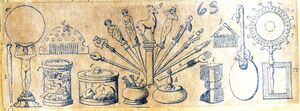
<Untitled> (Sir,— Would to heaven...)
Sir,—Would to heaven that such a Catholic council as you suggest might assemble to seek religion, not discuss theology ; but the cup and the platter are still all-important in the eyes of the priesthood, hence the course of their communion were the reverent leaders forcibly collected would not run smooth, and the end might probably be pieces rather than peace.
We must wait, I fear, until the angel “Fortuitous Concurrence,” who brings together in due order the inanimate atoms of the dust, performs the like service for the animate and conscious atoms of it; but the dust atoms have, it would seem, no chairman of their own; their government is apparently quite external and arbitrary. If that be also finally the case with the man atoms, I, their proposed chairman, should be thankful.
But if imperious “Fortuitous Concurrence” pinned me to this presiding as she pinned Cromwell to his, my first act would be to kick out Mr. Bradlaugh, and politely to hand out Messrs. Huxley and Tyndall, in a manner benevolent if “bigoted,” for even subdued light is unpleasant to bouncing bat and sapient owl—and then with closed doors await Pentecost.
Yet after all, supposing the Master whose teachings have been brought to us from far India by tender mother “Fortuitous Concurrence,” should be seen by the council as the Light of the World, the divinest conceivable revelation of the Heaven Father to the earth children, Immanuel to throbbing brains and weary hearts for whom this universe is one mighty manifestation of God Life, but who, in seeing Him see the Father, and are at rest. Is this unlikely? All is Divine that is in Thee, if Thou art not all the Divine.
In our most dull-eyed moments, when stars are stars, not eyes of heaven; when the wind is not His angel, and the fire is not His minister, and the clouds are not His chariots, oh! human-hearted Jesus, Thou art the* Word made flesh! “Who is the God to whom we shall offer our worship?”—I am, yours ever faithfully,
* The roaring loom of time which weaves for God the garment we see Him by. Let mental culture go on advancing; let science go on gaining depth and breadth, and the human intellect expand as it may, it will never go beyond the elevation and moral culture of Christianity as it shines forth in the gospels.—Goethe.
<Untitled> (Sir,— The note...)
Sir,—The note which has sounded in a letter signed “Emily Kislingbury” in your last issue will, I hope, recall Spiritualists who have the cause at heart to some of the real objects for which the elder students of the science have contested for so many years. Permit me, then, as one whose first note-books on the subject date from 1853, at a time when many of the present advocates had as yet not devoted attention to the subject, to attempt to check in some way the career of an investigation in which I have always felt much interest, in the hope that more powerful arms than my own may succeed in arresting it in what I must deem to be a downward tendency.
Before that “Niagara is shot” which each individual scientific inquirer must traverse for himself, it behoves us to ascertain whether much of the current literary and oral teaching of Spiritualism is consonant with the modes of investigation practised by the earlier inquirers, and whether the course which has been indicated by some is that which in the history of other sciences has been attended with success.
Spiritualism as a religion has been much praised, and I would in these days, when nearly every school of thought claims a right, and threatens a power to enforce its doctrines upon the minority, inquire what are its qualifications to be placed on the same pedestal with the most peculiar or smallest sect registered by law. If we seek among the ranks of <... continues on page 8-128 >
Editor's notes
- ↑ Sir,—I hope... by Kislingbury, Emily, London Spiritualist, No. 334, January 17, 1879, p. 34
- ↑ Sir,—I may be... by Carter Blake, C., London Spiritualist, No. 334, January 17, 1879, p. 34
- ↑ Sir,— Miss Kislingbury... by W.C.P., London Spiritualist, No. 334, January 17, 1879, p. 33
- ↑ image by unknown author
- ↑ Sir,— Would to heaven... by No Matter Who, London Spiritualist, No. 332, January 3, 1879, p. 11
- ↑ Sir,— The note... by Cakter Blake, C, London Spiritualist, No. 332, January 3, 1879, pp. 11-2
Sources
-
London Spiritualist, No. 334, January 17, 1879, p. 34
-
London Spiritualist, No. 334, January 17, 1879, p. 33
-
London Spiritualist, No. 332, January 3, 1879, p. 11

